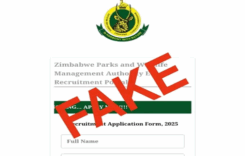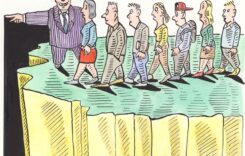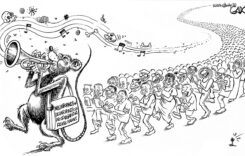
Report by Nevanji Madanhire
Claim: Zim climbs up Africa’s governance ranks, Herald 26 February 2018. (https://www.herald.co.zw/zim-climbs-up-africas-governance-ranks/)
Conclusion: Incorrect. The Ibrahim Index of African Governance (IIAG) has not listed Zimbabwe as one of Africa’s four most improved countries over the past 10 years in overall governance. Instead, Zimbabwe has been listed only as one of the four “largest improvers” in one sub-category, gross domestic product (GDP) growth in the Sustainable Economic Opportunity category.
What does the report say?
Zimbabwe’s overall governance is categorized as “slowing improvement” which means it’s not improving at the rate it should. It is ranked 39th on the continent of 54 countries scoring 44.7% in its overall governance score for 2017.
The report covers the 10 years from 2008 – 2017.
In the General Overview of the report the Mo Ibrahim Foundation states the IIAG is a tool that measures and monitors governance performance in African countries.”
“The Foundation defines governance as the provision of the political, social and economic public goods and services that every citizen has the right to expect from their state, and that a state has the responsibility to deliver to its citizens.”
In the IIAG, country performance in delivering governance is measured across four key components that effectively provide indicators of a country’s Overall Governance performance.
The key components that form the four categories of the IIAG are (Zimbabwe’s overall rankings and IIAG assessment in brackets):
· Safety & Rule of Law, (37/54, slowing improvement);
· Participation & Human Rights, (34/54, slowing improvement);
· Sustainable Economic Opportunity, (41/54, increasing improvement); and
· Human Development (30/54, warning signs).
A hundred indicators
Each of these categories contains sub-categories under which are organised various indicators that provide quantifiable measures of the overarching dimensions of governance. In total, the IIAG contains over 100 indicators.
The Herald report states that Zimbabwe is among four countries on the continent whose GDP increased over the past 10 years but neglects to mention that GDP growth is just one of the 100 indicators and that it does not have, on its own, a significant effect on the lives of the citizens and that is does not translate to the overall governance ranking of a country on the More Ibrahim Index.
“Economic growth has not resulted in improvement in Sustainable Economic Opportunity. Of the ten African countries with the largest percentage increase in GDP in the period 2008-2017, only four feature among the 10 largest improvers at the category level over the decade: Kenya, Liberia, Rwanda and Zimbabwe. The correlation between the size of a country’s GDP and scores in Sustainable Economic Opportunity in 2017 is weak (r= +0.19). When looking at the entire time series (2008-2017), the correlation appears to be weak as well (r= +0.16).”
The low correlation shows that the growth in GDP did not affect governance in a significant manner.
Safety and rule of law
The Herald story claims that Zimbabwe posted significant improvements on safety and the rule of law. In this category, Zimbabwe is ranked 37 out of 54 and the situation is adjudged to be “slowing improvement”. The category has four sub-categories (ranking and assessment in brackets) namely,
1. Rule of law (39/54, increasing improvement);
2. Transparency and accountability (38/54, warning signs);
3. Personal safety (42/54, slowing improvement); and
4. National security (30/54, warning signs).
GDP growth
This claim is verified by the IIAG. It says only four countries feature among the ten largest improvers at the (GDP) category level over the decade; these are Kenya, Liberia, Rwanda and Zimbabwe.
Electricity supply
The Herald story’s claim that Zimbabwe enjoyed more reliable source of electricity is correct in the period under review.
The IIAG report states:
“Of the 43 countries for which there is data, 25 have improved in the indicator Reliability of Electricity Supply over the decade. This number went up to 29 between 2013-2017. The five largest ten-year improvements are those of Uganda, Senegal, Zimbabwe, Cabo Verde and Chad (+31.0, +29.6, +28.5, +23.7 and +19.7, respectively)”.
Foreign investment
The story claims the environment for foreign investment improved but according to the IIAG the business environment was ranked 48 out of 54 meaning Zimbabwe is better than only six countries on the continent but is “bouncing back” according to the Report. On the sub-category Absence of restrictions on foreign investment Zimbabwe is ranked 41/54 adjudged to be improving, while on the sub-category Absence of excessive bureaucracy and red tape it is ranked 30/54 adjudged to mean “no change”. Generally the business environment is assessed to be “bouncing back”.
Antiretroviral Treatment (ART) Provision
Zimbabwe is ranked 1/54 in this sub-category, but according to the report the improvement is “slowing”. The country is still ranked 31/54 in overall health provision and “warning signs” are showing that this may not be sustainable.
Welfare policies and services
Welfare policies and services scored very highly at 12/54 and are showing “increasing improvement” but the promotion of socio-economic integration of the youth is a red flag showing “increasing deterioration”. General welfare was adjudged to be “slowing improvement”.
Environment
There was no change in environmental policies but promotion of environmental sustainability showed “increasing improvement”.
Gender equality
The promotion of gender equality was ranked 10/54 and “increasing improvement” was noted in this sub-category. Representation of women in the judiciary was ranked 1/54, but there was “no change”. Gender equality in the workplace was improving and was ranked 4/54 and showed “increased improvement”. Women’s labour force participation at 6/54 showed “increased improvement”. But there were “warning signs” with regard laws on violence against women and women’s political empowerment and women’s political representation.
Original source: 2018 Ibrahim Index of African Governance
(http://s.mo.ibrahim.foundation/u/2018/11/27173840/2018-Index-Report.pdf?_ga=2.259128778.1195410440.1551169316-257826390.1551169316)
Do you want to use our content? Click Here











